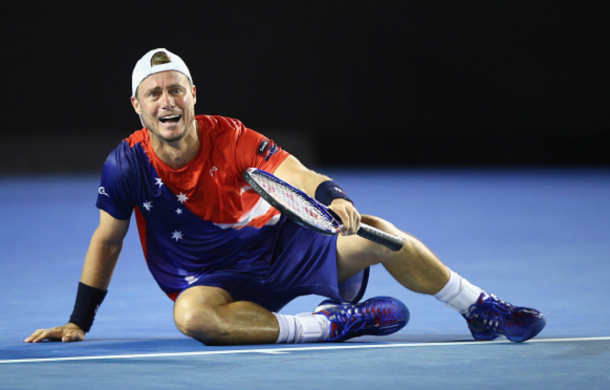The superlatives are many for Lleyton Hewitt; gutsy, determined, tenacious, persistent, warrior, legend.
His 20th and final Australian Open ended the way his first did all the way back in 1997, with a loss to a Spaniard. Dual French Open champion Sergei Brugera was the Australian’s first conqueror, while current world number eight and former Roland Garros finalist David Ferrer ended Hewitt’s career in relentless fashion.
The former world number one has graced the most prestigious tennis courts over the past 19 years, and has finished his illustrious career with 30 singles titles including the U.S. Open and Wimbledon, 3 doubles titles and 2 Davis Cups.
As a young fan, watching Lleyton Hewitt play was always a joy. His enthralling runs to the 2004 U.S. Open and 2005 Australian Open finals are key reasons why I became a tennis fan. The passion and energy that he exhibited on court was always inspiring.

Epic Matches
Hewitt will always be known for his five set epics and his unwillingness to let his opponent get the better of him. One key example of his fighting spirit was his 2003 Davis Cup semifinal rubber against Roger Federer.
The Australian was down two-sets-to-love and his hopes of winning were seemingly gone before he began to claw his way back into the contest. Despite only being two points away from losing, Hewitt was spurred on by the Rod Laver Arena crowd to record a 5-7, 2-6, 7-6, 7-5, 6-1 victory. It was one of the finest and most memorable wins in his career.
2005 Australian Open
Many more of Hewitt’s five set epics come to mind when thinking of his tenacity and determination. Two of these matches came in the same tournament, at the 2005 Australian Open. The former world number one got through his first three rounds quite comfortably before two grueling matches against Rafael Nadal and David Nalbandian.
In both matches Hewitt faced the ultimate adversity, first in the fourth round against a young and powerful Nadal, who ran the Australian from side-to=side using his now trademark forehand. The Spaniard was in complete control of Hewitt up until half way through the fourth set, before the Australian fought his way back. Hewitt would go on to break his fourth round duck and win 7-5, 3-6, 1-6, 7-6, 6-2.
He would back that up against Nalbandian two days later with another thrilling performance. The Australian was dictating play and took the first two sets before the Argentine forced the match to a decider.
The fifth set was an enthralling battle, with neither player being halted on serve during the set. Hewitt’s efforts to wrestle the momentum back from his opponent in the 2002 Wimbledon final were relentless, as his home crowd spurred him on to record a mammoth 6-3, 6-2, 1-6, 3-6, 10-8 victory en route to the final, where he would eventually fall to Russian Marat Safin.
Late Finish Against Baghdatis
The 2008 Australian Open would also prove to be one to remember for Hewitt and tennis fans around the world thanks to his third round match against Marcos Baghdatis.
It was a highly billed contest that began close to midnight due to late finishes to previous matches on Rod Laver Arena. Hewitt led 5-1 in the fourth set before the Cypriot managed to fight back and force the match to a fifth.
The Australian was not to be denied however, as he smashed a winner off a Baghdatis second serve and fell to his knees to record the latest ever win at a Grand Slam, claiming a 4-6, 7-5, 7-5, 6-7, 6-3 victory at 4:43 in the morning. This is a match that will forever be in Australian Open folklore.
Other Fond Memories
There are two other matches that I vividly remember from Hewitt over recent years, ones that I felt deserved recognition as impeccable performances. The first was at Wimbledon in 2009 against Radek Stepanek. The Australian was contesting the fourth round at the All England Club for the eighth time, and produced an extraordinary performance against the veteran Czech.
Stepanek was dominating play thanks the variation of his game, he was hitting clean winners from the back of the court as well as using his serve and volley technique effectively.
After falling two sets behind, Hewitt began to read the play of the Czech and never looked back from there. He showed why he was one of the best players in tight situations, and why he could never be counted out of a match. The Australian would win 4-6, 2-6, 6-1, 6-2, 6-2. It was the most fun that I have ever had staying up until five o’clock in the morning.
Another of Hewitt’s memorable performances was in the 2013 U.S. Open. He faced world number six and 2009 champion Juan Martin del Potro in the second round. The Australian was a clear outsider heading into the match, and Del Potro’s form leading into the tournament was ominous, but someone forgot to give Hewitt the script.
The Australian would roll back the clock and produce a vintage display of returning and shot making. After being down two-sets-to-one, he claimed a tense fourth set tiebreak and ran away with the deciding set to win 6-4 5-7 3-6 7-6 6-1 and remind fans that his career was nowhere near over.
Why Was He Great
Hewitt was always going to be considered a great from a young age, after winning his first tournament as a 15-year-old in Adelaide back in 1998 and beating Pete Sampras to win his maiden Grand Slam title at the U.S. Open in 2001 established that he had the extreme talent to have a successful career.
He became the youngest world number one in ATP history, and his win over Nalbandian in the 2002 Wimbledon final would etch his name in history for more than one reason. He was the first baseliner to win Wimbledon, providing a blueprint for players like Federer, Nadal and later Novak Djokovic dominate on the grass of the All England Club.
The back end of Hewitt’s career was riddled with injuries. His hips and toes started to give way, but they did not stop him from persevering and retiring on his own terms. It typifies the way that he played, back against the wall, but kept fighting until the very end. That is why he will be remembered as a legend of the game, and as emotional it was to see him hang up the racket; it was a privilege to watch him play over his long and decorated career.
He is one of my true sporting idols. Goodbye Lleyton, and thank you for the memories, they have been awesome.










































